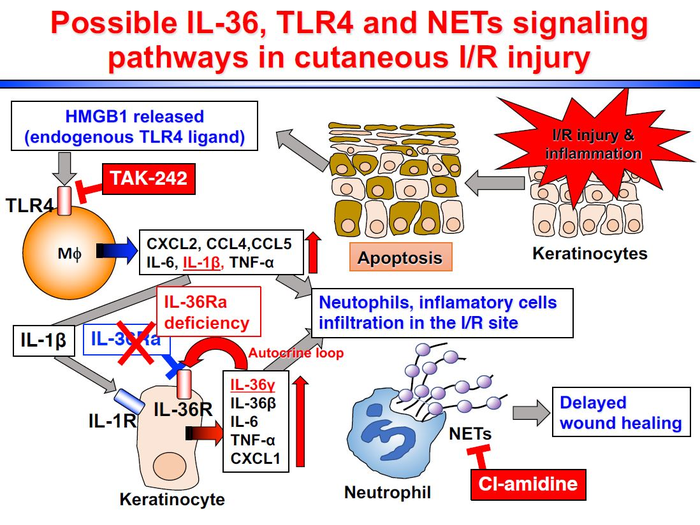Ischemia, which in modern Latin means, “staunching of blood,” is a medical condition in which the blood supply is cut off to different parts of the body. In patients who are bed-ridden, ischemia can manifest as pressure ulcers. Else, it could be the Raynaud’s phenomenon in someone under severe stress. This condition can be rescued by blood reperfusion to the affected areas. However, the latter carries the risk of injuries known medically as ischemia-reperfusion (I/R) injuries.

Credit: Yoshihito Tanaka from Fujita Health University
Ischemia, which in modern Latin means, “staunching of blood,” is a medical condition in which the blood supply is cut off to different parts of the body. In patients who are bed-ridden, ischemia can manifest as pressure ulcers. Else, it could be the Raynaud’s phenomenon in someone under severe stress. This condition can be rescued by blood reperfusion to the affected areas. However, the latter carries the risk of injuries known medically as ischemia-reperfusion (I/R) injuries.
Skin-based I/R injuries can be exacerbated by inherited immunological mechanisms, for instance in patients who are otherwise showing signs of slow wound healing. To understand the immunological mechanisms underlying the development of this condition better, scientists from Japan, building on previous studies, decided to narrow down their investigation to interleukin-36 receptor antagonist (IL-36Ra), a protein that plays a pivotal immunomodulatory role in wound healing.
Speaking about the motivation behind their research, Mr. Yoshihito Tanaka from Fujita Health University School of Medicine, Japan, who led the team of scientists in the investigation, explains, “We wanted to understand the immunological mechanisms involved in the healing of wounds from cutaneous ischemia-reperfusion injuries, such as pressure ulcers and Raynaud’s phenomenon, to narrow down possible therapeutic targets. Drawing from experience, IL-36Ra appeared to be a promising candidate for kickstarting our investigation.”
Accordingly, Mr. Tanaka worked with his team to understand how deficiency of IL-36Ra affects wound healing in cutaneous I/R injuries. For this, the scientists used mice knocked out for the receptor. Also, they induced cutaneous I/R injuries in knockout and wildtype control mice. Subsequently, they studied corresponding immunological responses in both groups of animals, including the time required for wound healing, infiltration of neutrophils/macrophages (key immune cells) to the site of the wounds, apoptotic skin cells, and activation of other unwanted immunological defense mechanisms. Their findings have been published as a research article in the Journal of The European Academy of Dermatology and Venereology.
The team, comprising Dr. Kazumitsu Sugiura and Dr. Yohei Iwata from Fujita Health University School of Medicine, among others, was able to pinpoint important results. The scientists found that the absence of IL-36Ra, indeed, significantly slows down wound healing in cutaneous I/R injuries, through increased apoptosis, or ‘suicide’ of useful skins cells, excessive recruitment of inflammatory cells, and employment of unnecessary proinflammatory mechanisms. Additionally, they demonstrated the role of Cl-amidine, a protein-arginine deiminase inhibitor as effective in normalizing exacerbated I/R injury in IL-36Ra mice. Based on these observations, the scientists assert their findings are the first conclusive report of the involvement of IL-36Ra in cutaneous I/R injury.
The scientists are positive that they have identified a stalwart therapeutic candidate against cutaneous I/R injuries in IL-36Ra. As Mr. Tanaka optimistically adds, “Our research may lead to the development of therapeutic agents for wound healing of various other refractory skin diseases too.”
The quest for novel therapeutic targets in skin wound healing might just have been empowered by these findings of the team and the future indeed looks brighter for alleviating the painful burden of cutaneous I/R injuries.
***
Reference
DOI: https://doi.org/10.1111/jdv.17767
About Fujita Health University
Fujita Health University is a private university situated in Toyoake, Aichi, Japan. It was founded in 1964 and houses one of the largest teaching university hospitals in Japan in terms of the number of beds. With over 900 faculty members, the university is committed to providing various academic opportunities to students internationally. Fujita Health University has been ranked eighth among all universities and second among all private universities in Japan in the 2020 Times Higher Education (THE) World University Rankings. THE University Impact Rankings 2019 visualized university initiatives for sustainable development goals (SDGs). For the “good health and well-being” SDG, Fujita Health University was ranked second among all universities and number one among private universities in Japan. The university will also be the first Japanese university to host the “THE Asia Universities Summit” in June 2021. The university’s founding philosophy is “Our creativity for the people (DOKUSOU-ICHIRI),” which reflects the belief that, as with the university’s alumni and alumnae, current students also unlock their future by leveraging their creativity.
Website: https://www.fujita-hu.ac.jp/en/index.html
About Mr. Yoshihito Tanaka from Fujita Health University
Mr. Yoshihito Tanaka is a graduate student at the Department of Dermatology of Fujita Health University School of Medicine. Mr. Tanaka extensively studies the immunological mechanisms behind dermatological conditions, specifically with animal models. He has over 11 publications to his credit, in reputed international journals, with over 16 citations.
Journal
Journal of the European Academy of Dermatology and Venereology
DOI
10.1111/jdv.17767
Method of Research
Experimental study
Subject of Research
Animals
Article Title
Cutaneous ischemia-reperfusion injury is exacerbated by IL-36 receptor antagonist deficiency
Article Publication Date
26-Oct-2021
COI Statement
The authors declare none.




